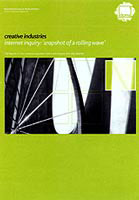The DCMS doesn’t surf
Could the Department of Culture, Media and Sport-backed Internet inquiry be seen as a futile, misguided attempt by the Government to jump on the digital bandwagon?

The Internet Inquiry report from The Department of Culture, Media and Sport-sponsored Creative Industries Task Force is fancifully entitled “snapshot of a rolling wave”, using postmodern lower case titles and a now rather exhausted surfing pun.
The problem with taking a snapshot of something as fast-moving as a rolling wave is that the result is apt to be blurred. And the report manages to support the misperception of the UK Internet industry as an inchoate group of businesses.
The inquiry was commissioned in 1999, headed by Click Music and Virgin Publishing’s Robert Devereux. Panel members were invited from the design, advertising, marketing, publishing and general media sectors.
Covering small to medium-sized enterprises – from start-ups to established businesses – the inquiry set out to examine in part the, to my mind, misguided belief that the Internet’s challenges and opportunities are all but unknown to SMEs.
The inquiry covered Government policy and regulation, business opportunities, payments and pricing, human resources and consumer issues.
The four subgroups of industry representatives are underwhelming. The design and advertising sector is served by the likes of Microsoft , Emap, The Telegraph Group, Millward Brown and IPC. It seems strange, given the scale of these companies, that Deepend and the report’s designer, The Attik are left to represent real design industry.
The most successful Internet design companies, such as Agency.com, USWeb/ CKS or Razorfish, are absent. Perhaps it was a case of who was willing to come forward or, even worse, who knew who, but it certainly indicates a startling lack of awareness of the major movers and shakers in the industry.
This is not a strong starting point from which to draw informed industry-wide consensus on the best way to understand and deal with the new economy.
In fact, this lack of representation, and an almost patronising view of SMEs, could bring into question the quality and type of advice given and the issues raised throughout the report.
Take a look at the key recommendations, many of which would not require a committee to make them, and you can immediately see that the report is already dated. They include suggestions, such as a call to promote the widest possible Internet access, which have either already been suggested by Government or have already been undertaken by the private sector.
The suggestion to “develop a communications strategy to encourage creative SMEs to exploit the Internet more effectively”, seems pointless. SMEs would appear to be in the front line of those exploiting the Internet. Perhaps funds would be more appropriately used in providing greater local authority assistance – such as rent-free periods on premises – to start-ups.
And, unhelpfully, the report does not include the summary of the findings of the Design, Advertising and Publishing subgroup.
While the report is a flag-waver for what seems to me to be the great British need for Government intervention, regulation and yet more advisory groups, it tends to ignore the fact that the Internet has always been its own greatest self promoter. It could even be argued that a lack of Government intervention is one of the reasons the Internet has prospered so far. Those consultancies, and their client SMEs which have benefited from its growth, have done so without the kind of assistance that this report urges.
It would be great if the Creative Industries Taskforce report produced something more than another website so full of text it could never be read by Cabinet members, the majority of whom, when I last enquired, still didn’t have e-mail addresses.
Stephen Byrne is director of Digital Strategy at Nucleus. He has worked in both the Government and private sectors, advising on and developing Internet-based commerce. The Creative Industries Task Force Internet Inquiry report can be found at www.culture.gov.uk/internetinq
-
Post a comment




